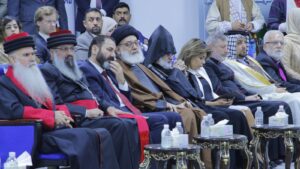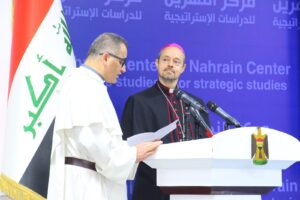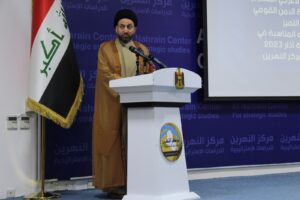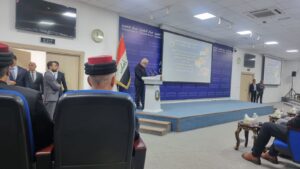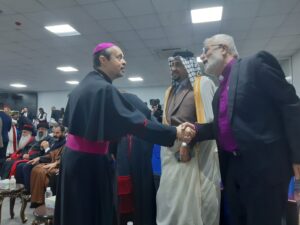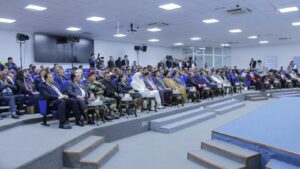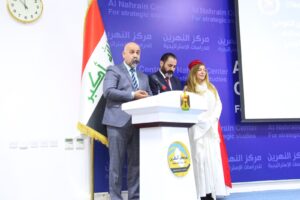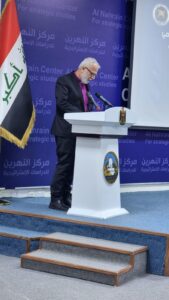On the occasion of the National Day of Tolerance, which falls on the sixth of March every year to coincide with the anniversary of the visit of His Holiness Pope Francis to Iraq in 2021, and over a period of two days, CAPNI, with the support of the World Council of Churches WCC and the Norwegian Church Aid NCA Organization, in partnership with the UFUQ Organization for Human Development and the National Security Advisory, organized a distinguished program under the auspices of the National Security Advisor, His Excellency Counselor Qassim Al-Araji, and the participation of representatives from the Iraq Presidency, the Council of Ministers, undersecretaries of ministries, in addition to the diplomatic corps in the person of His Eminence The Apostolic Nuncio and bishops from the Assyrian Church of the East, the Ancient Church of the East, the Armenian Orthodox Church and from the Iraqi religions, led by Sheikh Sattar Jabbar Al-Helou, Supreme Spiritual Head of the Mandaean Sabians, Yezidi Prince Ismat Tahseen Bey, Mr. Ammar Al-Hakim, representatives of the Judaism, Zoroastrianism and Kakai religions, in addition to representatives of civil society organizations and academic institutions, as well as representatives of the supporting and organizing bodies, where Mrs. Carla Khichoyan represented WCC Secretary General, Father Antoine Al-Ahmar representing the Middle East Council of Churches, Mr. Arne Sæverås representing NCA, Father Emanuel Youkhana (CAPNI Director), Dr. Ali Bakht (Director of UFUQ), Mr. Michael Benjamin (President of the Alliance of Iraqi Minorities AIM) and a wide range of interested people from all of Iraq.
The activity was held on the halls of (Al-Nahrain Center for Strategic Studies) in Baghdad, where its first day was a solemn festival aimed at identifying and introducing Iraqi minorities through many activities and paragraphs, including:
• More than twenty banners were erected, each of which included a picture and a brief introduction to one of the literary, sports or artistic figures of the Iraqi diversity (such as Ammo Baba, Sita Hakobyan, Haskeel Sason, Bir Khader Suleiman, and others from all Iraqi diversity).
• Distribution of a pamphlet (Colorful Iraq: An Introduction to Identifying Iraqi Diversity) published by CAPNI. The 52-page colored booklet includes a definition of text and image about 13 Iraqi diversity components.
• Artistic and literary performances such as national and heritage costumes, an Armenian choir, a song about Iraqi diversity, a folk-dance group whose members wore Iraqi diversity costumes, a poem in Assyrian and its translation into Arabic by the Arab poet Amer Hamza, and other activities
• An introductory video presentation on Iraqi minorities prepared by AIM
• Introductory video about WCC, CAPNI and UFUQ work in the field of Iraqi diversity issues
• An introductory video on the activities of the National Security Advisor in this field.
The program included speeches from His Excellency the National Security Advisor, Mr. Qassim Al-Araji, Mr. Ammar Al-Hakim, Apostolic Nuncio, WCC, CAPNI, UFUQ, Jews representative, a speech from the Aryan religions (Yazidi, Kakai, Zoroastrian), many of which (CAPNI, UFUQ, AIM, Aryan Religions) touched on the existential challenges and threats facing minorities.
At the end of the ceremony, WCC presented shields of appreciation to His Excellency the National Security Advisor for sponsoring the celebration, Mr. Saeed Al-Jayashi, Chairman of the National Strategy for Diversity Management Task Force, and Al-Nahrain Center for hosting the celebration.
On the second day of the program, an open debate session was held between the Diversity Management Strategy preparation team on the one hand, and participants who reviewed the situation of minorities and the discrimination they face, especially in legislation and practices, and recommendations to address imbalances and weaknesses.

